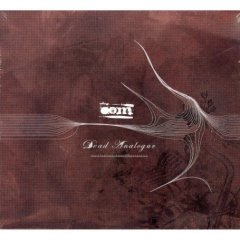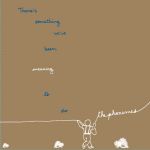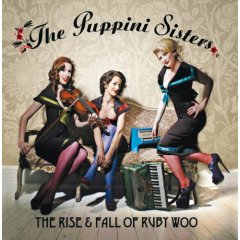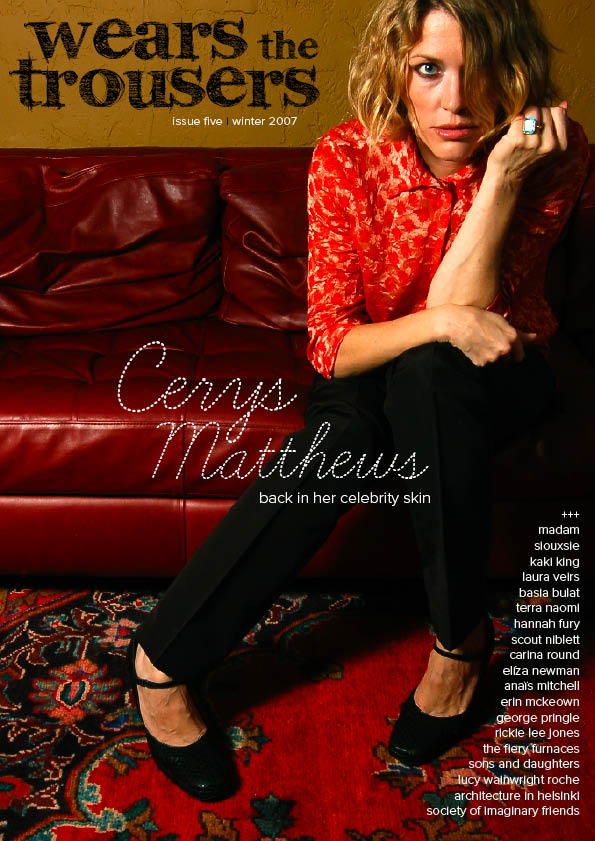Filed under: album, back issues, review | Tags: alex ramon, amanda farah, andy wasley, anja mccloskey, claire robinson, hugh armitage, lisa ono, ollabelle, oom, over the rhine, paramore, ping pong bitches, po' girl, puppini sisters, scott millar, sinead o'connor, siobhan rooney, the phonemes, trevor raggatt, yoko ono
The following reviews were published on our old MySpace blog in 2007.
_____________________________________

Sinéad O’Connor
Theology •••½
Rubyworks
From the beginning of her career, Sinéad O’Connor’s name has been synonymous with risks, the controversy surrounding her sometimes gaining as much, if not more, attention as her voice. But Theology – released 20 years after her multi million-selling debut The Lion & The Cobra – sees her taking a different kind of risk in the by now familiar arena of religion. Indeed, religion has long been an obsession of the O’Connor rumour mill, ever since that infamous moment when she tore up a photo of the Pope live on American TV. Since then she’s become an ordained minister in an off-shoot of the Catholic church and, later, wholeheartedly embraced the Rastafari faith (culminating in the woeful reggae excursion Throw Down Your Arms). In 2005 she even went so far as to claim that her mission was to “rescue God from religion”.
Theology, then, is O’Connor proclaiming her conflicted feelings for all to hear, should they still care. Theology, too, gives us reason to still care: O’Connor has tackled her subject matter very successfully, neither overly pious nor accusatory. And though it has its shortcomings – a cover of ‘I Don’t Know How To Love Him’ from ‘Jesus Christ Superstar’ is, unfortunately, as cheesy as it sounds – the album, for the most part, maturely and comprehensively addresses the idea of faith in a way that is easy to relate to. It is not only declaring that one has faith, but also questioning why one has faith, what that faith is, and in troubled times, how one can continue to have faith.
And that’s not all. If an album with religion as its central theme were not risky enough, Theology is a double album. The first disc, recorded in Dublin, and the second, recorded in London, have almost identical tracklistings, the difference being in the songs’ accompaniment. The first disc is essentially O’Connor alone with an acoustic guitar, while the second couches her in the studio with a full band. It keeps things interesting, and long-time fans will no doubt be delighted with the opportunity to find each and every little difference in the recordings. For the rest of us, the second disc may seem superfluous given how well O’Connor shines in the solo context. Download both versions of the brilliant ‘If You Had A Vineyard’ and see what I mean.
Amanda Farah
_____________________________________

Ollabelle
Ollabelle
Rounder / Me & My
It’s a crying shame that it’s taken a full three years for Ollabelle’s eponymous debut to get a domestic release. Rounder Records once again prove themselves to be Americana heroes, for if there’s one thing Ollabelle has that this country has been missing, it’s soul. Serious soul.
Formed at an East Village blues and gospel jam night, Ollabelle comprises five members (the female contingent being Fiona McBain and Amy Helm – daughter of The Band’s Levon Helm) of diverse backgrounds but a singular passion for the music they create. Discovered by T-Bone Burnett, he wisely signed them to his own label. From the first a cappella notes, handclaps and washboard percussion of opening number ‘Before This Time’ it’s clear that Ollabelle are something special. Rootsy touches abound throughout the album, with Hammond, slide and dobro all making their presence felt among the acoustic guitars, rhythm section and dripping-honey harmonies.
For the most part, the tunes are drawn from the classic blues and gospel songbook with songs such as ‘Jesus On The Mainline’, ‘Get Back Temptation’ and ‘No More My Lawd’, though a few self-penned inclusions are thrown in for good measure. All are delivered with a tone that strikes a perfect balance between the traditional and contemporary. Respect for the music remains paramount; this is truly soulful and heartfelt stuff, not some sort of gospel-lite R&B knock-off. Where the band attempt to stretch their legs and cut loose, a psychedelic flavour creeps into the tonal palette: ‘Elijah Rock’ and a louche updating of the Son House classic, ‘John The Revelator’ are simply perfect recordings in this respect.
Ollabelle is a truly stunning debut and should really be a centrepiece in the CD collection of any lover of blues, Americana, gospel or roots music. Here’s hoping a UK release of the follow-up, Riverside Battle Songs, won’t be too far behind.
Trevor Raggatt
_____________________________________

Lisa Ono
Soul & Bossa ••½
Deckdisc Brasil
Japanese culture is famously diverse – some blinkered commentators might say bizarre – and, on occasion, somewhat opaque to Western observers. How, for example, can a country that is home to some of the world’s most ancient and beautiful art also be home to that perennial ‘Tarrant On TV’ favourite, the comically sadistic game show ‘Endurance’? How can a nation with one of the world’s most effective healthcare systems also dine on fugu, the puffer fish dish that, although exquisitely tasty, can apparently be 1200 times more toxic than cyanide? To this list, add one more question: how can a nation with such variety and colour as Japan be hooked on a singer as unexciting as Lisa Ono?
Perhaps that is putting it a little too strongly. Lest we forget, Ono, a Brazilian expat, is one of the most popular bossa/jazz artists in the world and almost certainly the most popular in Japan. Like Brian Eno, Kenny G et al, she has made her home in the card shop-friendly world of pleasant background music; the problem is that when listening to Ono one senses that, like an undiscovered seam of gold beneath a Californian hill, there are riches under the surface waiting to be exploited.
Soul & Bossa, Ono’s latest collection of covered songs, might just shimmer with the odd fleck of gold. However, they are few and far between; there is nothing inherently awful about the album, but it is hard to pick highs and lows because it is crushingly average. ‘I Got You (I Feel Good)’ is a decent enough example; Ono tames James Brown’s classic into a pleasing enough bossa, but in the process strips it of its rawness and power. ‘I Feel Good’ without Brown’s exuberant barking and shrieking is rather like a tiger without its teeth and claws; pretty enough, but lacking excitement and just…well…nice. ‘Georgia On My Mind’ is similar in style and in effect; previously performed by Ray Charles (epic, emotional, intense) and Ella Fitzgerald (sultry, languid, warming), Ono’s version (nice, nice, nice) might just leave the listener wanting to choke a jazz flautist.
There is, however, gold in them thar hills. Ono’s sensitive performance of ‘Nada Mais Lately’ is powerfully redolent of Charlotte Gainsbourg’s throaty, sultry style, and thoroughly outshines the bland quality of much of Ono’s work. Another Portuguese piece, ‘Eu Você’, sounds bright and sophisticated and sizzles with Latin intensity. Elsewhere, ‘You’ve Got A Friend’ is a clever piece of work, mixing a refrain from Delibes’s ‘Flower Duet’ with a low-down, pleasing bossa that, thankfully, is a long way from the AA’s saccharine-sweet use of the song in its most recognisable format.
Listening to Soul & Bossa isn’t as painful as ‘Endurance’; nor is it as exciting as fugu. It’s a perfectly nice, perfectly average, perfectly innocent album that will suit anyone who wants to put on the headphones and relax for an hour. It is, perhaps, the “nice cup of tea” of current jazz.
Andy Wasley
_____________________________________

Yoko Ono
Yes, I’m A Witch ••••
EMI
As the Beatles-Lennon furore recedes into the mists of pop culture past, the much-maligned Yoko Ono has emerged from the scrum to be recognised as an important avant-garde artist “in her own right” (to coin a condescending phrase). The re-evaluation of her challenging music continues with this engaging album, a collection of remixes by some painfully hip contemporary musicians (among them Peaches, Le Tigre, Antony, Spiritualized’s Jason Pierce, The Flaming Lips, the Polyphonic Spree and The Apples in Stereo) that pays homage to her influence and clearly aims to introduce her work to a new generation. (A similar compilation of dance mixes of her songs is also available.) The choice of material on Yes, I’m A Witch spans Ono’s career from her early experimental work with Lennon to her solo albums of the 1970s and ‘80s, with the artists retaining Ono’s original vocals and creating new backing tracks for them. The result is a predictably uneven but nonetheless highly enjoyable album that makes a compelling case for the accomplishments of a composer who was clearly way ahead of her time.
Following Public Enemy producer Hank Shocklee’s brisk ‘Witch Shocktronica Intro’, proceedings get off to an energetic start with busy, electro-techno reworkings of ‘Kiss Kiss Kiss’ and ‘O’oh’, from Peaches and Shitake Monkey, respectively, the latter benefiting from a judicious sample of the opening riff of Grover Washington Jr.’s ‘Mister Magic’. Blow Up effectively transport ‘Everyman…Everywoman’ into the realm of psychedelic rock, and though the already-unsubtle empowerment anthem ‘Sisters O Sisters’ doesn’t really profit from Le Tigre’s addition of a little megaphone agitation (“Women united will never be defeated!”), the song remains a pleasing rabble-rouser. However, it’s Porcupine Tree’s sparsely atmospheric take on ‘Death Of Samantha’ – and the chilling shudder in Ono’s voice as she sings “Every day I thank God I’m such a cool chick baby” – that moves this album into more emotional and rewarding terrain.
Those more familiar with the (arguably sexist and racist) media image of Ono than her musical output will be surprised to find that there’s very little which is scary or forbidding about this music. The record may open with the heavy irony of Ono declaring “Yes, I’m a witch / I’m a bitch… / I don’t care what they say”, but much of the material is appealing, inviting and even consoling, many of the lyrics featuring positive statements that sometimes veer perilously close to a Hallmark greeting card. This is particularly true of ‘Revelations’ with its succession of positive-thinking mantras and earnest benedictions: “you are a sea of goodness / you are a sea of love… / bless you for what you are.” But the elegant sparseness of Cat Power’s treatment transcends the banality of the sentiment and turns the song into a powerful piano-led duet.
Other highlights include The Apples in Stereo’s soaring, majestic take on ‘No One Can See Me Like You Do’ and Jason Pierce’s feedback-drenched makeover of ‘Walking On Thin Ice’. Elsewhere, Antony and Hahn Rowe do well by ‘Toyboat’, while The Flaming Lips take on ‘Cambridge 1969′ with characteristic brio. The album ends on a reflective note with Craig Armstrong’s reworking of ‘Shiranakatta (I Didn’t Know)’, a song of poignant regret punctuated by Ono’s heartrending inquiry: “why didn’t you tell me you were in pain? / I would have come to you so quickly.”
Throughout Yes, I’m A Witch there’s a directness and immediacy to Ono’s writing and singing that pierces your defences. If you’re a fan already then this album – an amalgam of remix disc, tribute record and collaborative project – will provide you with the pleasure and excitement of rediscovery. If you’re a newcomer, it will challenge any lingering prejudices you may have about Ono’s work and leave you eager to hear more.
Alex Ramon
_____________________________________

Oom
Dead Analogue ••
Series 8
“Like a grunged up Portishead with Björk on vocals,” Radio 1 DJ Zane Lowe exclaims of Brighton-based quartet Oom, who offer up their debut album, Dead Analogue. Hmm. There is much to be suspicious of when hearing things described as ‘the new this with a touch of that and a smidgen of whatever’. Such statements are invariably either completely meaningless, or suggest something so lacking in originality that it can only be described by the things it tries to emulate. I fear the latter is indeed true of Oom.
Mr Lowe is at least partly right – Oom does indeed sound like Portishead (though where the Björk comparison came from we will never know). Indeed, that’s the first thing that strikes you when the vocals kick in on the first track, ‘Poison’. If you weren’t paying full attention it would be easy to think it was Portishead. This is all that most people would bother to say about Oom – that they sound like Portishead. Unfortunately, it is my duty to give a comprehensive review of Dead Analogue, so it falls to me to find more things to say about it.
Here goes. Before the Oom’s Debbie Clare breaks in with her best impression of Beth Gibbons’s vocal style, ‘Poison’ begins with a strange pulsing intro. This noise is irritating and somewhat dirty sounding, which may be where Mr Lowe’s “grunged up” comment comes from. These strange computer-generated baarps and blatts are distributed generously throughout the album, and make for something that is less musical and more downright annoying (though ‘Paranoia’ does offer some variation by containing what seems to be the whining of a poorly tuned radio instead).
Lyrically, Oom take their cue from Portishead as well and are suitably dreary. Witness such fine examples as “you left me for dead” (‘Black Heart’) and “I am the eye of the storm when there’s nothing left to see” (‘The Storm’). Ms Clare makes an admirable attempt at drawling them out in as sultry and suffering a manner as she can, but there are times when it sounds that, vocally, she is taking on more than she can handle. Some notes are rather strained.
This album isn’t irredeemably bad. There are no particular points of blood-curdling horror. I’m sure that people who enjoy strange blatty and baarpy music might find it quite pleasant. The real problem with Dead Analogue is that it sounds like nothing more than an inferior copy of something else. If I saw someone eyeing it in a shop I would point them towards Portishead’s Dummy instead. Dead Analogue simply has no oomph (sorry, it had to be done), no originality. And who wants to listen to a bad imitation of a better band?
Hugh Armitage
_____________________________________

Over The Rhine
The Trumpet Child •••½
Great Speckled Dog
Blending elements of country, jazz, soul, swing and torch song, The Trumpet Child, the umpteenth album by Ohio natives Over The Rhine, plays out like a primer to American roots music. Centred around the wonderfully named husband-and-wife team of Linford Detweiler and Karin Bergquist, the band have gone through several line-up changes in the 16 years that they’ve been recording. This time around, however, the central duo have surrounded themselves with a piano-and-brass ensemble whose contributions give many of the songs a delightfully woozy, loose, late-night barroom ambience. The result is an appealing album that, though firmly rooted in tradition, feels thoroughly fresh and contemporary.
Mixing some pleasingly surrealistic imagery with more traditional lyrical approaches, the eleven songs are well served by Bergquist’s compelling vocal style, a luxuriant croon that sometimes suggests a homelier Billie Holliday mated with a less abrasive Lucinda Williams. The haunting, jazzy title track, the propulsive ‘Entertaining Thoughts’, the rollicking Tom Waits homage ‘Don’t Wait For Tom’ and the delicious domestic reverie ‘Let’s Spend The Day In Bed’ are among the highlights of the set, but it’s the brilliant ‘If A Song Could Be President’ that arguably emerges as the standout. The track is a wry but heartfelt speculation on the consequences for America if its media and politicians were replaced by its music. Paying affectionate lyrical homage to Steve Earle, Lightnin’ Hopkins, Patsy Cline, Emmylou Harris, John Prine and Neil Young (“even though he came from Canada”), the song is at once a subtle critique of “where our country went wrong” and a proud, loving celebration of the America’s rich cultural heritage. The lyric “pass it around on an MP3” couldn’t be more appropriate; this is the kind of track you instantly want to share with everyone you know, one that already sounds like a classic.
At its least good, The Trumpet Child wears its influences a little too heavily, sometimes allowing its penchant for homage to slip into pastiche. But taken as a stylish synthesis of a range of music traditions, the album is a very enjoyable experience. “I don’t want to waste your time with music you don’t need,” Bergquist sings, and, for the most part, Over The Rhine make good on that statement.
Alex Ramon
_____________________________________

Paramore
Riot! •••
Fueled By Ramen
Southern pop-rockers Paramore are the kind of band that err on the digestible side of rebellion. Like ‘emo’ rockers Jimmy Eat World before them, Paramore’s music falls along the teen-friendly punk spectrum but, uniquely, they remain credible in a way that eludes similar bands. This may be thanks in part to the inclusion of ketchup-haired frontwoman Hayley Williams whose voice, an effervescent yet gritty coupling, hits all the right notes and gives Paramore a female edge over all-male competitors without the empty bravado of Avril Lavigne. Despite being voted Kerrang! magazine’s #2 Sexist Female, a dubious if lucrative honour, Williams has dismissed the importance of her gender, claiming that Paramore’s only aim is to produce good music. Indeed, one thing is certain: they know how to make some damn catchy songs.
Riot!, the band’s unambiguously named follow-up to their debut, All We Know Is Falling, lives up to its name within seconds of pressing play. ‘For A Pessimist, I’m Pretty Optimistic’ spurts into being, breathlessly introducing Josh Farro’s lead guitar and brother Zac Farro’s signature crashing drums. The title of the track, referring to Williams’s moral victory over a disappointing ex, could well be regarded as a summation of the band’s take on the ostensibly doom-laden emo genre, which seems rather perky if compared to anything by The Cure. Oddly enough, Williams has cited the gothic quartet as a personal influence, though Paramore’s youthful, confrontational style owes little to Robert Smith’s more lyrical brooding.
‘Misery Business’ and ‘Crushcrushcrush’, two of the album’s singles, promise to have listeners fumbling for the repeat button. The former, a brilliantly cathartic song inspired by a manipulative girlfriend, explodes into frenetic guitars punctuated by Zac Farro’s drums about a minute from the track’s close before Williams successfully wrests the spotlight back to her vocals. Similarly, ‘Crushcrushcrush’ exhibits some masterly drumming and equally defiant lyrics but with a subtlety that is perhaps more accessible to newbie rockers. Skipping the sickly ‘We Are Broken’, the jaunty ‘Fences’ has a whiff of bluegrass and a warning about the perils of fame, all while hinting at the band’s genesis as a funk covers outfit. ‘Hallelujah’, meanwhile, is a radio-friendly but not unappealing guitar-flecked tune.
With the exception of Paramore’s rather un-rock ‘n’ roll stance on using the Lord’s name in vain (Williams apologised to fans for the use of ‘god’ in ‘Misery Business’), the album’s only faults arise from the limitations of its genre. Though producing some infectiously memorable tracks, it is questionable whether the band would remain sufficiently distinctive were they fronted by a man. Inevitably, too, Paramore’s brand of punk is rather teen-centric, so for those of us who have graduated from uncomfortable adolescence into perhaps more experienced forms of angst, Riot! could be a miss.
Siobhan Rooney
_____________________________________

The Phonemes
There’s Something We’ve Been Meaning To Do •••½
Blocks Recording Club
On their debut album, Toronto’s The Phonemes unveil their own version of an indie film soundtrack full of lovingly assembled acoustic harmonies and ear-catching sounds. When a record opens with the lyrics “oh I met a man who thought he was a tree” (‘Tree’), a certain fascination with what is to come is pretty much guaranteed. With only a few simple chords filling the spaces between what is almost a completely vocal number, it makes for an affecting start to an album that sweetly enchants and ensnares your attention.
As ‘Tree’ merges almost seamlessly into the beautiful, lyrically inventive ‘Pain Perdu’, The Phonemes continue to impress with elegant melodies and a liberal sprinkling of surprising touches. Take ‘Easter Suit’ and ‘Wedding Suits’, for instance; the former’s savvy a cappella breaks and feisty protestation lead into the latter’s vividly descriptive lyrical tale with barely-there backing. Then, if the softness of the preceding songs has lulled you into a false sense of security, be prepared for the comparatively rough-edged ‘Municipality’. Vocalist Magali Meagher (former guitarist for The Hidden Cameras) unleashes her best raspy vocal for ‘Kim Rogers’ with splendid results.
Further surprises await with ‘Lewis’, a much more instrumental song that effectively conjures the colourful image of a Spanish dance troupe commanding the floor, and the angelic Anglo-French delight ‘Plate Dance’. With its gently alluring pull ‘Oh Sleep’ brings proceedings to a perfectly apt conclusion. If this is what The Phonemes have been meaning to do, be glad that they’ve finally gotten around to it and hope that procrastination doesn’t get the better of them again.
Claire Robinson
_____________________________________

Ping Pong Bitches
Alphadog •••
Umami
It’s nigh on seven years since Malcolm McClaren protégés Ping Pong Bitches released their self-titled debut EP on Alan McGee’s Poptones label. In that time the Bitches have parted company with McClaren, Poptones and original member Mandy Wong and reinvented themselves as a four-piece. Why it’s taken them so long to release their first full-length album is a mystery, and what’s also somewhat surprising is that a couple of songs from that first EP are still knocking around, albeit apparently re-recorded (although ‘Rock Action’ still features the original guitar riff by the presumably McClaren-recruited Steve Jones).
Okay, so ‘Rock Action’ and ‘Beat You Up’, the other oldie, are among the best track on the album and provide the finest examples of the electro rock/techno punk that was the Bitches’ original ethos. The rest of the album, whilst retaining the electro feel, is often rather more pop than punk – perhaps the influence of the owner of their new label, Mark Moore, formerly of S’Express, who signed the Bitches as his first artists.
That’s not to say that Alphadog is a bad album by any means. Founding members Emily Hell and Louise Prey share the lead on the majority of tracks, their voices complimenting each other and the eclectic backing with seemingly little effort. They spout their abject nonsense with a conviction and apparent glee that rapidly becomes infectious. Once you’ve established that the Ping Pong Bitches are, hopefully intentionally, a great long string of clichés and definitely not to be taken too seriously, thus allowing yourself to hear lyrics such as “Feel the beast, feel the beast in me / come on baby won’t you set me free” (‘The Beast’) or “Gimme gimme gimme your rock action / harder harder harder” (‘Rock Action’) without guffawing, you can then settle down and begin to feel the throbbing – see they’ve got to me – bass riffs and disturbingly catchy synthesisers to full effect and start to think to yourself, perhaps slightly grudgingly, that this is actually pretty good. Even a cover of Honor Blackman and Patrick MacNee’s 1990 chart hit ‘Kinky Boots’ succeeds against the odds.
Overall, it’s a well-produced record with a full sound that never seems cluttered despite the vast array of instruments and sounds (including a touchtone telephone on first single ‘Roc Ya Body’) and if you can ignore the rock clichés, cartoon schoolgirl innuendo and the fact that you have no idea if this is post-modern disco, futuristic dance punk, retro techno rock or some hitherto unknown but entirely obvious new genre, it’s at worst inoffensive and at best thoroughly entertaining.
Scott Millar
_____________________________________

Po’ Girl
Home To You •••
Diesel Motor / Nettwerk
A maxim of reviewing is not to come to an album laden with preconceptions, especially when they’re positive ones. It’s doubly galling when they end up being dashed. Canadian alt-folk, punk-bluegrass combo Po’ Girl, who number Trish Klein of The Be Good Tanyas among their ranks, come with a favourable prejudice-inducing reputation as a kickass live act. Indeed, I found myself expecting Home To You, their third album, to be a smiliarly high-energy mix of modern Americana.
The reality, however, is somewhat lacklustre. ‘Shades Of Grey’ opens on a promisingly laidback country footing, containing touches of all the genre’s best elements – great songwriting, affecting harmony vocals, subtle banjo and fiddle. ‘Drive All Night’ is less encouraging, and it’s here that we identify a number of problems that recur throughout the album.
It’s understandable that a band like Po’ Girl might want to keep their music on the raw side. But there’s a thin line between raw and just plain rough. Too many songs on Home To You fall the wrong side of that line. Vocals that might have harmonised with a bit more work seem to clash, competing rather than complementing. And, sure, clarinet is an odd choice of instrument for a solo but that’s something I can go with – what’s less appealing is the mistimed pizzicato of Diona Davies’s violin, suspect tuning and the “let’s just stop” endings.
Over the course of the album the couldn’t-care-less vocal delivery on songs like ‘Nine Hours To Go’, ‘Angels Of Grace’ and the title track becomes a little tedious. More songs like ‘Shades Of Grey’, ‘To The Angry Evangelist’ and ‘Ain’t Life Sweet’ would have been welcome. Home To You is a good, if patchy, album, but a band as interesting and gifted as Po’ Girl should have delivered so much more.
Trevor Raggatt
_____________________________________

The Puppini Sisters
The Rise & Fall Of Ruby Woo ••••
Universal Classics & Jazz
Little over a year since they set concert halls the country over alight with their quirky, close-harmony covers of well-loved 1940s numbers and bold adaptations of more modern classics such as ‘Wuthering Heights and ‘I Will Survive’, The Puppini Sisters are back with a back. With a new look, a new sound and even a few self-composed Puppini belters, the ever so stylish trio of Marcella Puppini, Kate Mullins and Stephanie O’Brien have clearly put a lot of energy and thought into their second release. The Rise & Fall Of Ruby Woo (named after the favoured shade of lipstick of Cure singer Robert Smith) is a much more daring venture than their debut Betcha Bottom Dollar, concentrating on the ups and downs of amour, besotted bliss and disintegrations.
Over several listens it becomes clear that the sequencing of the songs holds a genius all of its own, reflecting a twisted and fascinating storyline, the interdependence of the songs adding to the moody and authentic feel of the album. We are straight in with ‘Spooky’, known to most through Dusty Springfield’s version. A prominent and urgent double bass sets the haunted scene before the Puppinis chime in with those signature tight harmonies. The pace is fast and the band clearly revel in the uptempo swing with drum solos, close-mic’d string arrangements and a whole lot of attitude from the girls. Double bass is also prominent in the Bangles cover ‘Walk Like An Egyptian’, accompanied by subtle, almost lingering drums. The thrillingly different arrangement – unusual harmony intervals, Eastern-sounding instrumental interludes with a Jewish tough, obstreperous vocal interplay with a male choir – gives this girlgroup classic a whole new touch. The rather old-fashioned ‘Old Cape Cod’ is tackled at a much slower pace, complete with legato accordion chords, and is much more in line with the work we know from Betcha Bottom Dollar. The Puppinis trill in perfect harmony with dynamics worked out to the tiniest details. Impressive stuff.
As promised in last year’s Wears The Trousers interview, the girls have started to pen their own songs. ‘Soho Nights’ is the first of five self-composed works on the album and features some interesting chord and harmony choices as the fast-moving guitar and rhythmical double bass gives the song a Spanish flavour. It’s a quick-witted composition, recorded in such a way that puts the listener directly into the room, making them feel the beat of the pounding drums. The brilliant ‘I Can’t Believe I’m Not A Millionaire’ picks up the same close-mic’d delicate feel. Much bluesier, with lazy, sexy vocals, it has a sarcastic tone and oozes comic despair: “Look for my limousine / once more it’s not there / I can’t believe I’m not a millionaire”. ‘Jilted’, ‘And She Sang’ and ‘It’s Not Over’ are equally worthy and show a great deal of attitude, bent notes, sporadic percussion and, most importantly, strength.
There are some genius covers on this album, old and new. Certainly worth mentioning is the adaptation of Beyoncé’s ‘Crazy In Love’. The Puppini Sisters have managed to turn an instantly recognisable song into a musical Puppininised wonderland. Jazzy drums, tight vocals and a touch of Argentinian tango flair make for a bold but clever arrangement. All in all this is another great album from the London-based trio. It’s great to see the Puppinis heading into trickier territory, writing their own songs, implementing bolder arrangement and recording techniques, and moving away from what some people might see as a cabaret version of the Andrews Sisters. Because, really, these girls are so much more.
Anja McCloskey










